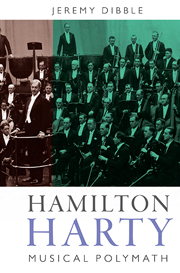Book contents
- Frontmatter
- Dedication
- Contents
- List of Illustrations
- List of Music Examples
- Preface
- Abbreviations
- Epigraph
- 1 1879–1901 Hillsborough, Belfast and Dublin: A Musical Apprenticeship
- 2 1901–9 London (1): A Pre-eminent ‘Collaborator’ and Aspiring Composer
- 3 1909–14 London (2): Composer and Conductor
- 4 1914–20 The War Years and After
- 5 1920–27 The Hallé Years
- 6 1927–33 Apogee: From Hallé to the LSO
- 7 1933–6 America and Australia: An Unforeseen Romance
- 8 1936–41 The Last Years: The Children of Lir – A Creative Codicil
- APPENDIX 1 List of Works
- APPENDIX 2 List of Recordings
- Bibliography
- Index of Harty's Works
- General Index
- Music in Britain, 1600–2000
7 - 1933–6 America and Australia: An Unforeseen Romance
Published online by Cambridge University Press: 05 December 2013
- Frontmatter
- Dedication
- Contents
- List of Illustrations
- List of Music Examples
- Preface
- Abbreviations
- Epigraph
- 1 1879–1901 Hillsborough, Belfast and Dublin: A Musical Apprenticeship
- 2 1901–9 London (1): A Pre-eminent ‘Collaborator’ and Aspiring Composer
- 3 1909–14 London (2): Composer and Conductor
- 4 1914–20 The War Years and After
- 5 1920–27 The Hallé Years
- 6 1927–33 Apogee: From Hallé to the LSO
- 7 1933–6 America and Australia: An Unforeseen Romance
- 8 1936–41 The Last Years: The Children of Lir – A Creative Codicil
- APPENDIX 1 List of Works
- APPENDIX 2 List of Recordings
- Bibliography
- Index of Harty's Works
- General Index
- Music in Britain, 1600–2000
Summary
In January and February of 1933 Harty fulfilled engagements as guest conductor of the Rochester Philharmonic Orchestra and the Cleveland Orchestra. Travelling over on the Mauretania he had to hurry to be with the Cleveland Orchestra for their first pair of symphony concerts on 5 and 7 January in Severance Hall. In the Cleveland press, Adelle Prentiss Hughes, the manager of the orchestra, was heard to comment: ‘“You were fortunate to arrive as early as you did. … Fortune must have been with you and the ship.” “I'll say fortune was with them,” he [Harty] laughed. “The Mauretania brought over one of the big payments on the war debt from Great Britain to the United States”.’ After the first concert the press took most interest in Harty's arrangement of Handel's Polonaise, Arietta and Passacaglia and Delius's A Walk to the Paradise Garden, both of which were new to the Cleveland concerts; at his second pair of concerts, on 12 and 14 January, most attention was devoted to Berlioz's ‘Royal Hunt and Storm’ (from Les Troyens) and Harty's own With the Wild Geese. After two pleasant weeks in Ohio, where he was constantly entertained to dinner by the orchestra's patrons and management, he went on to New York where he also conducted. There, on 18 January, the press was intrigued to cover the meeting of four great Irishmen – Harty, Oliver St John Gogarty the Free State Senator, John McCormack and W. B. Yeats – who were guests at a banquet thrown at the Waldorf Hotel by wealthy Irish-Americans.
- Type
- Chapter
- Information
- Hamilton HartyMusical Polymath, pp. 223 - 259Publisher: Boydell & BrewerPrint publication year: 2013



